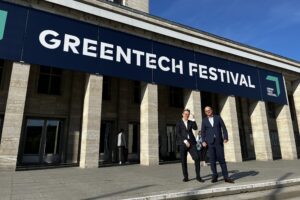Helm po raz drugi – czyli wersjonowanie i rollbacki dla Twojej aplikacji
Opisujemy jak wykonać aktualizację i rollback w Helm, jak elastycznie nadpisywać wartości oraz odkryjemy, czym są i jak działają szablony.
 Autor:
Autor:In an era of growing environmental awareness, more and more companies are looking for ways to reduce their impact on the environment. Software development is no exception – applications can generate a significant carbon footprint, especially if they are poorly optimized. Did you know that data centers are responsible for about 1% of global energy consumption? The good news is that developers can actively reduce CO2 emissions by optimizing code, infrastructure, and application architecture. Check out our practical tips!
The more optimized the code, the less resources the application consumes. Here are some key principles:
The right system architecture can significantly reduce energy consumption:
Data processing and storage has a huge impact on the carbon footprint of an application. How can it be optimized?
Frontend is not just about UX, but also about environmental impact. Here are some ways to make your apps more energy-efficient:
Regular testing and optimization are key to minimizing energy consumption:
An eco-friendly approach to software development is not only a trend, but also the responsibility of developers. Code optimization, choosing energy-efficient technologies, data management, and regular testing can significantly reduce the carbon footprint of your application. By implementing the above practices, you not only reduce infrastructure costs, but also contribute to environmental protection.
Does your company already apply these principles?

Helm po raz drugi – czyli wersjonowanie i rollbacki dla Twojej aplikacji
Opisujemy jak wykonać aktualizację i rollback w Helm, jak elastycznie nadpisywać wartości oraz odkryjemy, czym są i jak działają szablony.
AdministracjaInnowacja

Helm – czyli jak uprościć zarządzanie w Kubernetes?
Warto o tym wiedzieć! Czym jest Helm, jak go używać i jak ułatwia on korzystanie z klastra Kubernetes?
AdministracjaInnowacja

INNOKREA na Greentech Festival 2025® – zdobyliśmy zielone serce Berlina!
Jak wygląda przyszłość zielonych technologii i jak nasza platforma wpisuje się w ideę recommerce? Relacjonujemy nasz udział w Greentech Festival w Berlinie – zobaczcie, co przywieźliśmy z tego inspirującego wydarzenia!
WydarzeniaZielone IT